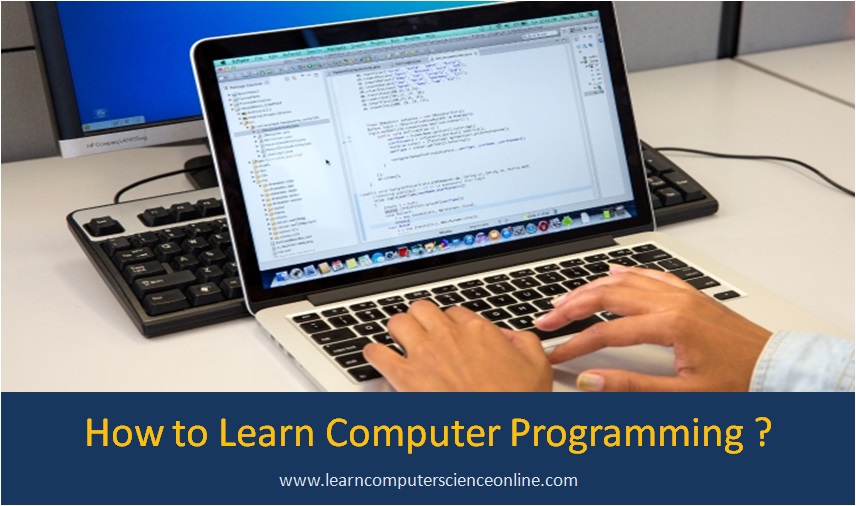
Computer programming is defined as process of writing a set of instructions called program that directs the computer to perform a specific task. The set of instructions are written in programming language that computer can decode and execute.
The Computer Programming continues to be the most popular choice for students opting a career in computer science. Learning Computer science is now considered to be one of the best career option .
The Computer programming expertise can get you your dream job with top notch technology company as a software developer with excellent financial rewards . The computer programming skills can put your career on the fast track.
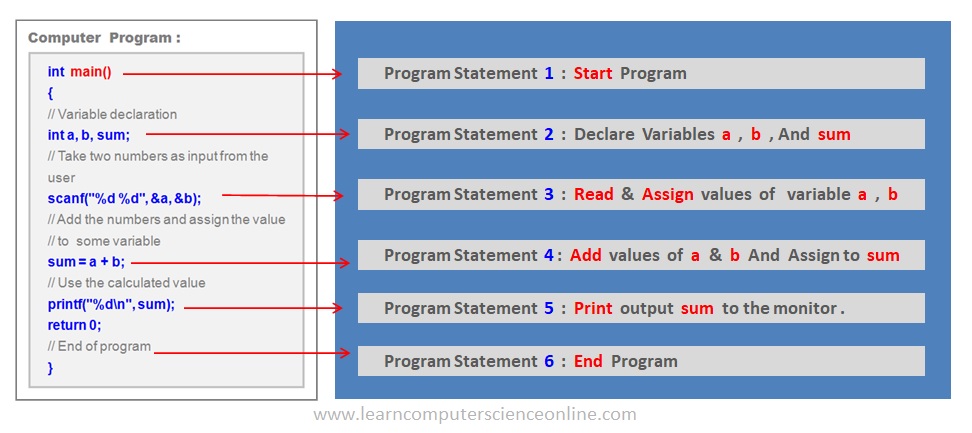
A computer program is a set of statements written in a computer programming language which directs the computer hardware to perform specific operations.
A computer program can be written in any programming language depending upon the purpose and type of the software being developed.
In this tutorial , we will learn what is a computer program, how program works, program compilation, and other important topics related to the computer programming.
Computer programming can be defined as the art and science of creating a set of instructions that computers can decode and execute to perform specific tasks. It involves writing the code in specific manner, testing, and debugging code to solve specific problems.
At its core, programming is about translating human ideas and logic into a language that computers understand that is binary. Programmers use human readable programming languages ( high level languages ) such as Python, Java, C++, and JavaScript to write code as per the predefined rules , syntax, and within the limits of other acceptable constrains.
Computer Programming - FAQ
Some of the most common and frequently asked questions related programming include :
- What Is A Computer Program ?
- What are different types of Programming Languages ?
- Why Computer System needs Computer Program ?
- What is Application And System Program ?
- What Is Program Compilation ?
- How CPU Executes Program Instructions ?
- What Are Programming Paradigms ?
What Is Computer Programming ?
Let us first understand what is a Computer System . A Computer system can also be defined as programmable electronics device that can be programmed to accept some inputs in terms of data , then process this data as per the program instructions and provide the Output in the desired format that can be used for some meaningful work .
The Computer System must be first programmed to perform a specific job on the computer . Further , the Computer is a digital electronic machine .
That means , the computer can understand and execute instructions on in binary which consist of only two numbers that is 0 and 1 .
The binary code is also referred as machine code or machine language .
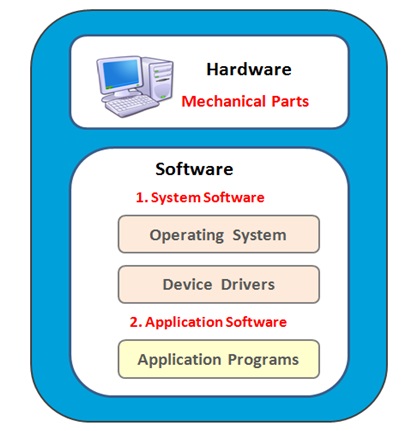
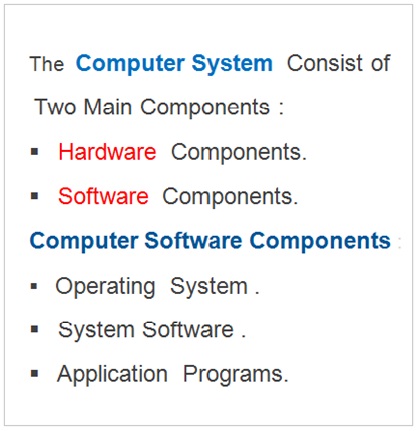
What Is Computer Program ?
Computer programming is the process of creating sets of instructions, popularly known as code, that enable computers to perform specific tasks or solve problems. Programming involves designing, writing, testing, and maintaining computer programs using programming languages.
Programming is a fundamental skill in today’s digital age, as it powers a wide range of applications and technologies we use in our daily lives. From mobile apps and websites to complex software systems, programming is at the core of their functionality.
A computer program is a group of instructions written using a computer programming language ( Such as C , C++ , Java , Python ) .
The computer programs are written to perform a specific task . For example , A computer Program ( Software ) to play music in your computer OR to play game and so on.
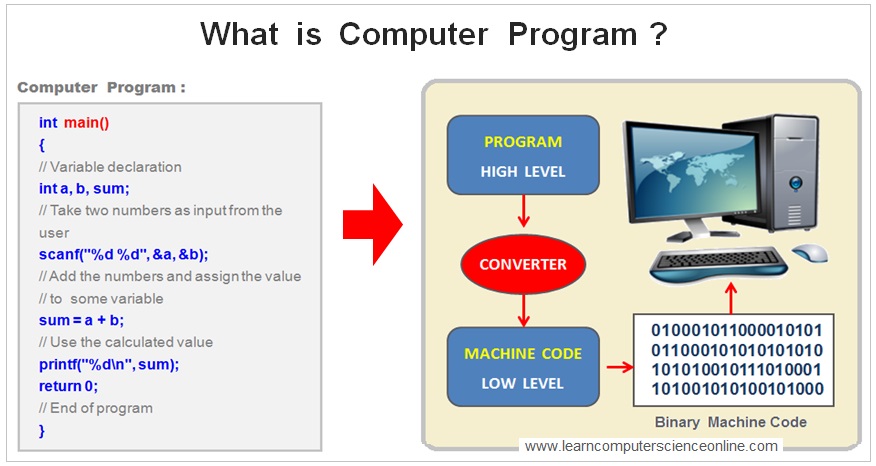
Each computer program usually consist of number of program statements . Each program statement performs a part of the job . The programmer must write the program statements as the programming language syntax .
Computer programming, often simply referred to as programming or coding. It is the process of designing and writing a set of instructions that a computer can follow to perform specific tasks or solve particular problems.
These instructions are typically written in a programming language. Each programming language has its own formalized set of syntax, rules and program must be written as per specific language syntax.
These programming languages are typically like English language that allows humans to communicate easily with computers. Such programs are referred as high-level program. However, as we know computer understands only Binary instructions. Therefore, high level programs must be converted to low level binary machine code at the execution stage.
In essence, computer programming is the art and science of writing instructions for computers to perform useful tasks. It plays a crucial role in nearly every aspect of modern science, technology and software development. Programmers use their skills to create software applications, websites, databases, artificial intelligence systems, and much more.

Each programming language has its own syntax ( Set Of Rules ) which clearly defines the manner in which the computer program statements can be constructed.
The programmer can choose any programming language of his choice depending upon the type of the software application to be developed .
Computer Programming Process
The process of computer programming typically starts with identifying a problem or a task that needs to be solved. Programmers then analyze the problem, break it down into smaller components, and develop an algorithm or a step-by-step solution to solve it. The next step is to choose a programming language that is suitable for the task at hand.
Programming languages provide a set of rules and syntax that programmers use to write code. There are numerous programming languages available, each with its own strengths and areas of application. Some popular programming languages include Python, Java, C++, JavaScript, and Ruby.
Once the programming language is chosen, programmers write code by following the syntax and rules of that language. They use various tools and integrated development environments (IDEs) to write, edit, and debug their code. The code consists of instructions that tell the computer what operations to perform, such as calculations, data manipulation, or interacting with external devices.
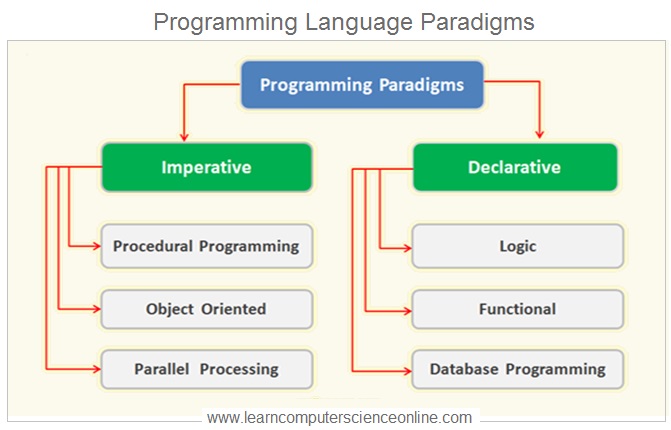
After writing the code, programmers need to test and debug it to ensure that it behaves as expected and produces the desired output. They identify and fix any errors or bugs that may cause the program to malfunction. Testing and debugging are essential steps in the programming process to ensure the reliability and correctness of the program.
Computer programming is a creative and iterative process that often requires problem-solving skills, logical thinking, and attention to detail. It offers a wide range of career opportunities, from software development to data analysis, artificial intelligence, and web development.
Learning computer programming opens up doors to creating your own software applications, automating repetitive tasks, and understanding the underlying technology that drives the digital world. It is a skill that empowers individuals to bring their ideas to life and contribute to the advancement of technology.
Key Elements Of Computer Programming
1. Program Instructions
Each program consists of set of instructions. Programming involves creating a sequence of detailed instructions, also known as code or a program. These instructions directs the computer what actions to perform.
2. Computer Hardware
Programming is focused on instructing a computer or a computing device. The computer system consists of various hardware components. Computer hardware also means any computing device such as a desktop computer, laptop, smartphone, or embedded system. It is the hardware that executes specific operations.
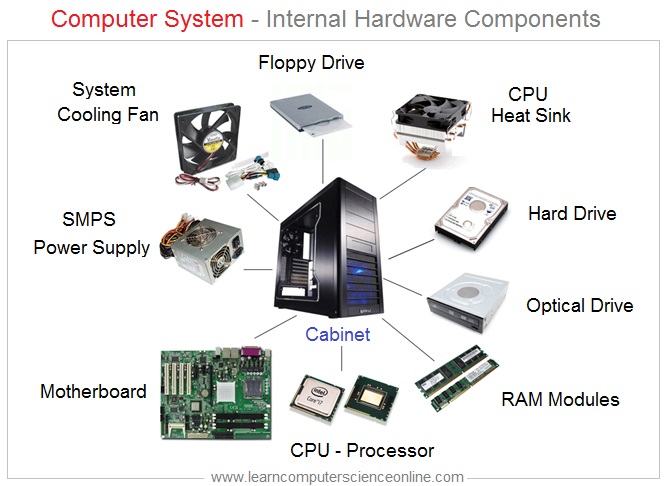
3. Programming Language
Programmers use programming languages like C, Python, Java, C++, JavaScript, and many others to write code. Each language has its own syntax and semantics, making it suitable for different types of software solutions.
4. Problem Solving
Programming is a problem-solving activity aimed at providing solution to a specific problem. Programmers identify problems or tasks that can be automated or solved using a computer and then write code to that provides solves those problems.

5. Algorithm Development
Problem that needs solution is broken into set of smaller problems. Programmers often create algorithms, which are step-by-step procedures for solving a problem. Algorithms serve as the blueprint for writing code.
6. Debugging And Testing
Once the program or software is created the next stage is debugging and testing. Programming stage also involves debugging and testing code to ensure it works correctly. Debugging is the process of finding and fixing errors or “bugs” in the code. The end result is software that is ready for deployment.
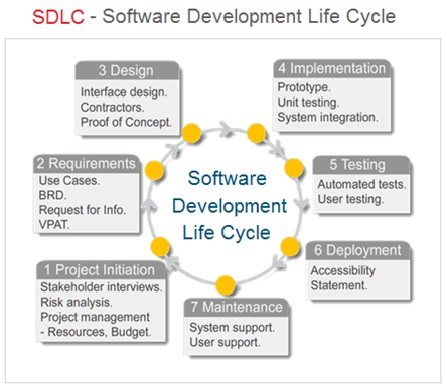
Computer Program Compilation
The computer system only understands and can execute program statements in Machine Code which is in Binary consisting of only two digits , that is 0 ( zero ) and 1 ( one ).
The CPU ( Central Processing Unit ) is the system brains . The CPU can decode and execute only program instructions in binary.
And therefore, the computer programs written in any high level programming language must be first converted into machine code in binary.
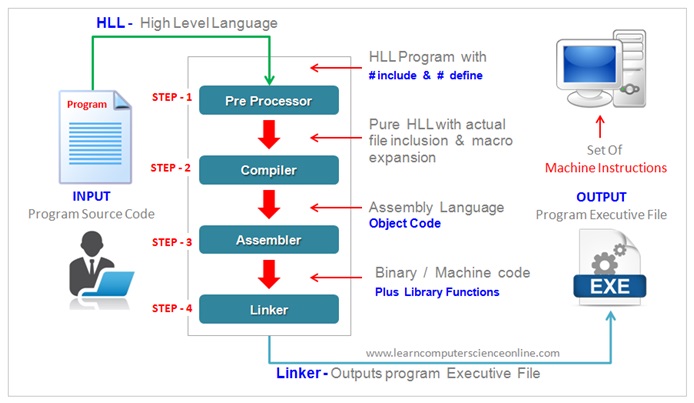
This conversion process is referred as program compilation. Each programming language has its own compiler which converts the program code into executable program ( Machine code in Binary ) . The converter program is referred as compiler .
How Computer Program Is Executed ?
The program execution starts when the user gives the command to the operating system to run any program.
The operating system then initiates the program execution by allocating the necessary resources such as memory and the processor time.
The operating system then loads the program executable copy and its data into the main system memory RAM.
The Central Processing Unit ( CPU ) starts the program execution by fetching the program instructions and data from the main memory RAM.

The CPU operates on the data as per the program instruction and the processed data ( Result ) is then either sent to a output device such as display monitor Or could be stored into any permanent storage ( Secondary Storage ) device such as hard disk for future use .
Types Of Programming Languages
The programming languages are generally classified as high and low level language . The higher level programming languages are more human readable and the lower level programming languages are machine readable. However, the computer system can execute only low level programs in machine code in Binary.
The computer programming languages are classified on the basis of ease of readability of the language , program execution speed and the level of abstraction in the programming language.
The computer programs are generally written in higher level programming languages such as Java , C++ , Python which provides a high degree of abstraction and mask the complexity of the low level programming language such as assembly language .
Levels Of Programming Languages
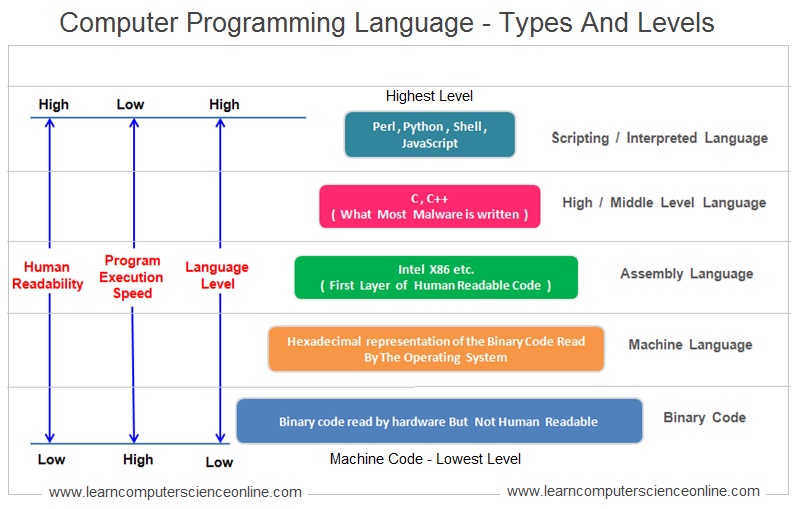
The high level programming languages are more human readable whereas the low level programming languages provide least abstraction.
And therefore, it is relatively far more difficult to read and write the program in low level language such as assembly language .
The program execution speed is higher for the programs written in low level language whereas the programs written in high level language have relatively lower execution speed .
Computer Programming
Compiled Vs Interpreted Programming Language
Depending upon the type of programming language , A computer program can either be compiled or interpreted during its execution .Compiler and Interpreter are two different ways to execute a program code .
The computer program can be either written in a programming language or scripting language.
During the compilation process , A compiler takes the entire program code and converts it into object code which is typically stored in a file. The object code contains library references which is replaced by actual binary code by the linker .
The binary code after linking the object code can be directly executed by the computer system. Examples of compiled programming languages are C and C++
Compiled Program
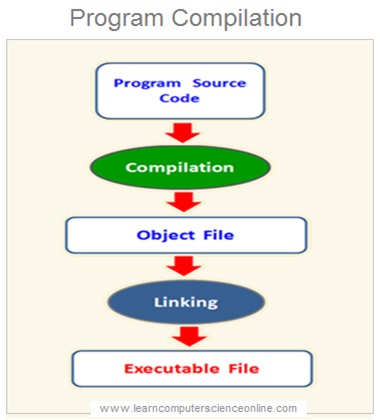
Interpreted Program
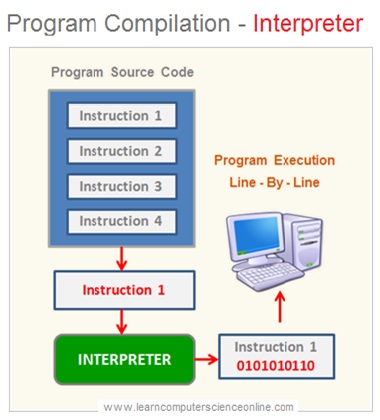
Whereas an Interpreter directly executes instructions line by line written either in a programming language or scripting language without any prior converting them to an object code or machine code.
The Python is an examples of interpreted language. Similarly , the java program is first compiled to an intermediate byte code , which is then executed by the Java Virtual Machine ( JVM ).
Application Programming
Software , Software Package , Software Application
The application programs are developed to provide solution to specific user problem . The application programs are also referred as application software or simply an application.
The application programs provide an interface to the user for using the computer system for specific purpose .
For example , the user might work on the accounting software for accounting jobs . The most commonly used application software are Microsoft Word , Excel and PowerPoint .
The Application software provide a very user friendly graphical interface to get the specific job done for which that application software has been designed.
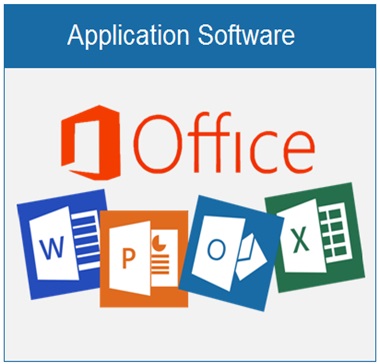
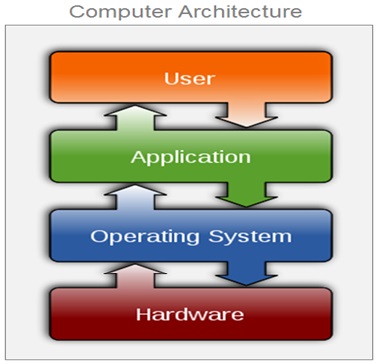
System Programming
System Software , System Program
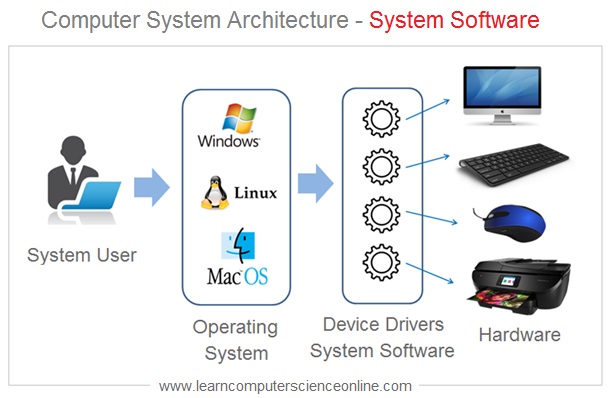
The System Software is a collection of programs provide interface to interact with computer hardware. The system programs are designed to operate , control and extend the processing capabilities of the computer system itself .
The system software programs are usually designed and developed by the computer manufacturer to communicate with specific hardware components connected to the computer system such as device driver software necessary to connect that hardware to the computer system.
An Operating System is an essential component for all computer systems .The operating system provide an interface to the user to communicate with the system hardware.
The operating system ( OS ) is the most commonly used example of system software. The Operating System manages all the application programs and the hardware components attached to the computer system.
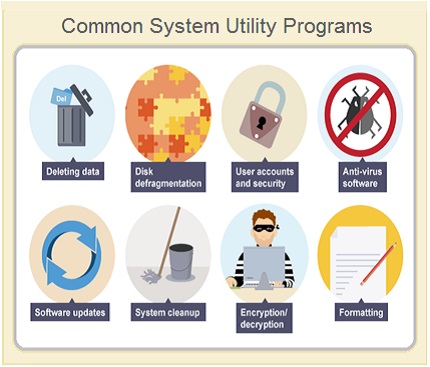
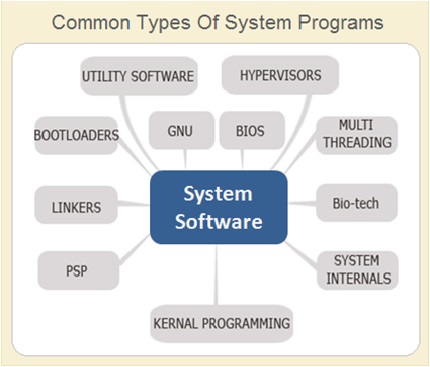
The operating system makes use of some system software called as utility software which allows the user to manage the computer system.
There are many different utility programs for different purpose and they may vary across operating systems. These utility software can be accessed by the user via a special menu or control panel in the operating system .
Program Compilation
A Computer program is a set of instructions written by a programmer in a computer programming language .
Each computer system has a CPU ( Processor ) which is the brain of the system . The CPU is responsible to decode and execute the program.
The CPU is the main component which performs arithmetic calculations and logical operations .
However , The CPU can understand and execute program instructions only in machine code which is binary representation consisting of 0 ( zero ) and 1 ( one ).

All computer programs must be first converted ( either compiled or interpreted ) to machine code before it can be executed by the computer .
A Program compilation is a process in which a human readable program code written in any programming language ( such as C , C ++ , Java , Python ) is converted into a machine readable code in binary ( using only 0’s and 1’s ).
This program conversion to binary code is done by using a special program called either compiler OR Interpreter depending upon the type of the programming language .
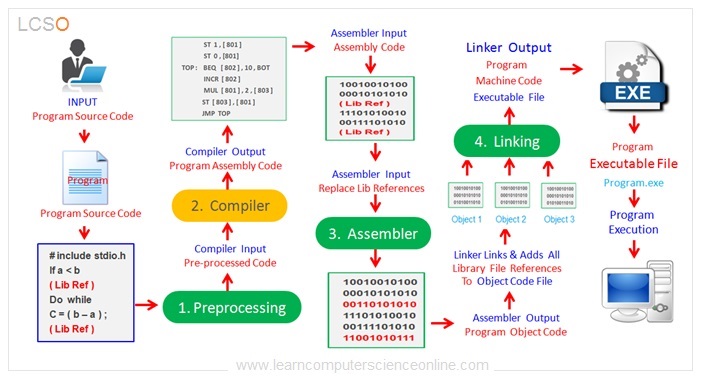
The compiler only converts the program source code in to the Object code ( Binary Code ) . The object code cannot be directly executed by the operating system .
The Object code file needs to be further processed by another program called “Linker” which is built in to the compiler .
The compiler may produce number of object code files for a single program source code file . The object code consist of machine code instructions in binary which is equivalent of corresponding high level program instructions in program source file .
And therefore , linking is needed to link all object code files and other files together to create an “Executable” file .
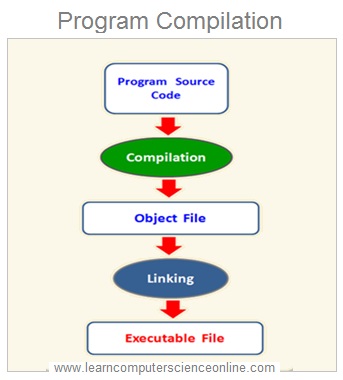
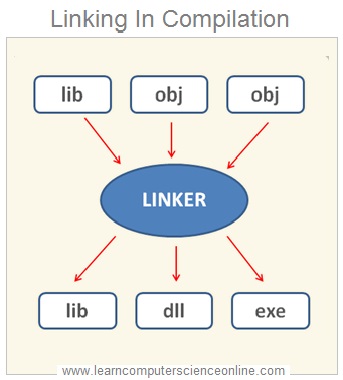
The programmer can use these user defined functions and standard function libraries by simply including these files in the beginning of the program header section .
Since the standard library code is in the object code form which is a pre-compiled format and can be directly included in the linking stage by the linker while creating an executable file ( sourcefile.exe ) during the program compilation process .
The programmer can use these user defined functions and standard function libraries by simply including these files in the beginning of the program header section .
Since the standard library code is in the object code form which is a pre-compiled format and can be directly included in the linking stage by the linker while creating an executable file ( sourcefile.exe ) during the program compilation process .

During final stage of compilation process , whenever the linker finds a reference to a library routine in the object file, it reads the library files ,then finds that routine and replaces the programmer’s reference with the actual code for the routine from the library file.
After it has replaced all the references with actual code from the library files , the linker then creates an executable binary file which can be executed by the operating system ( OS ).
Programming Paradigms
Types Of Approaches To Organize The Program Code
The programming languages can also differ on the basis on organizing the program code and manner in which data is handled in the program . The programming paradigm defines a particular style of writing and organizing the program code .
There are many programming paradigms out of which the two most important programming paradigms are the procedural paradigm and the Object Oriented Paradigm ( OOP ) .

Procedural Programming
In procedural programming , the problem is bifurcated in to number of small problems known as procedures ( Also alternately referred as functions Or methods ) .
Each of these procedures provide solution to part of the problem . These procedures can be called many times depending upon the algorithm of the program to solve a particular problem .
The procedural programming languages are generally the first preferred choice for students to learn the computer programming . Some of the most popular procedural languages include C , Fortran , Pascal and Basic.
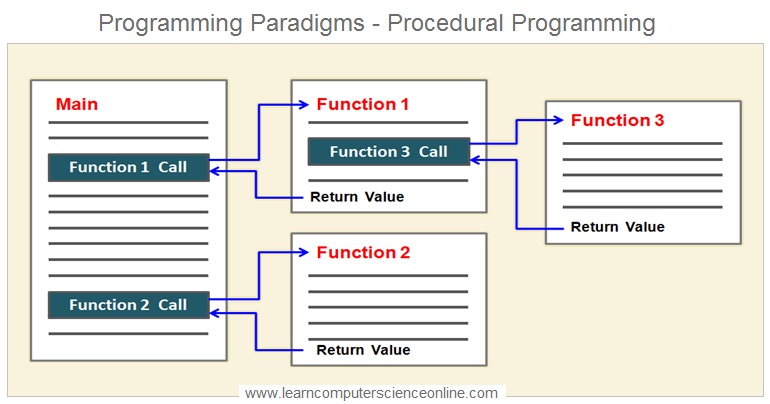
A procedural program is written as a list of instructions, directing the computer hardware to step-by-step to perform desired operation.
As the name suggest , in this approach , a group of program statements is written to solve one task and declared as a procedure .
The program consist of the main function or program block, subroutines, functions, procedures , header files , includes / modules , libraries. During the program execution , the a procedure may be invoked number of times.
Limitations Of Procedural Programming
In procedural programming the data ( program variables ) are mostly global and accessible to all the functions . For a large programs it is very difficult to keep the track of the changes in the data being operated upon by many functions simultaneously .
Such changes in the data can adversely affect the functionality of other functions . Similarly , when the new data is added all the functions operating on that data also need to be modified accordingly .
The most serious limitation of the procedural programming is the tendency for large procedural-based programs to turn into “spaghetti-code” since the dada access is not controlled and might get accidently changed by other functions.
The Spaghetti code is functionally useless program code . It is very difficult to debug the spaghetti program code .
And therefore, programmer should follow the standard best coding practices to avoid program resulting in to such badly tangled Spaghetti code .
Structured Programming
The Structured programming ( sometimes known as modular programming ) is a subset of procedural programming that enforces a logical structure on the program being written to make it more efficient and easier to understand and modify.
Structured programs makes extensive use of the program control structures such as sequence , decision / selection and repetitions like loops .
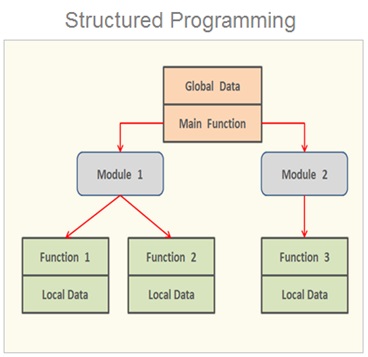
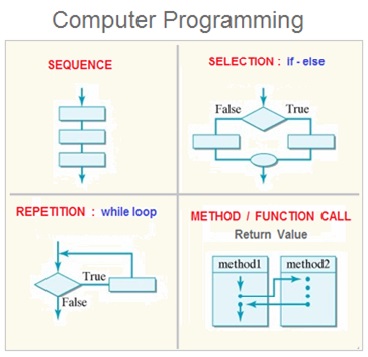
The Structured programming is a programming paradigm that helps to improve the clarity, quality, and development time of a computer program by making extensive use of procedures, block structures and looping structures like for loop , do while loop and while loop.
Object Oriented Programming
The Object Oriented Programming ( OOP ) is an approach to software application development where all application components are treated as objects. An object is a component of a program that has its own data and methods.
An object knows how to perform certain actions and how to interact with other elements of the program. Objects are the basic units of object Oriented programming .
In Object Oriented Programming ( OOP ) , a Class is simply a description of an object and the Class defines the datatype for an object .
A class is a design time entity used to define the object. Whereas an object is a runtime entity created during the program execution .
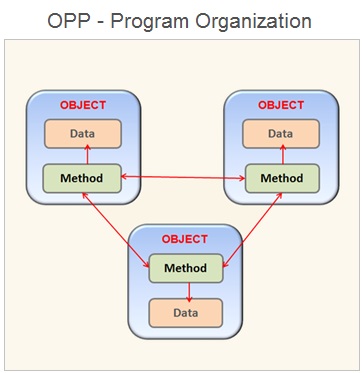
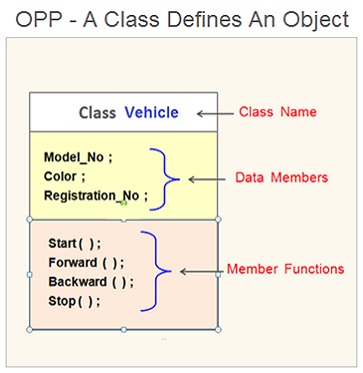
A class is the blueprint , or a plan , or a template, that describes the details of an object. A class is the blueprint from which the individual objects are created.
A Class is composed of three things :
1. Class Name , 2. Attributes , 3. Operations.
Advantages Of Object Oriented Programming
The Programs once developed and operational continues to be in use for a considerable period of time even if the support is discontinued .Such code is referred as Legacy code.
The legacy code needs to be supported , either to be improved upon ( for a new version of an exist piece of software ) or made to work with newer computers and software.
How To Learn Programming ?
A career in computer programming can be very rewarding and completely worth the time , efforts and patience which you need to invest while learning the computer programming.
Some people initially find learning computer programming a bit scary and tedious. However , once you learn your the first language than learning the second programming will be much easier.
With the help of best learning practices, you can easily learn the computer programming without much difficulty. If you follow the right learning strategy then you can learn any programming language without any problem .
Now , Let us discuss this learning strategy in detail .
- Learn professional programming skills.
- Learn the Fundamentals Of Computer Science And Programming.
- Learn Both Theory And Practical.
- Learn the Best Programming Practices.
- Start With Simple Programming Language.
- Focus on logical thinking.
- Work On the Project.
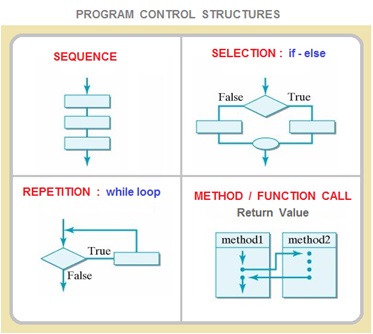
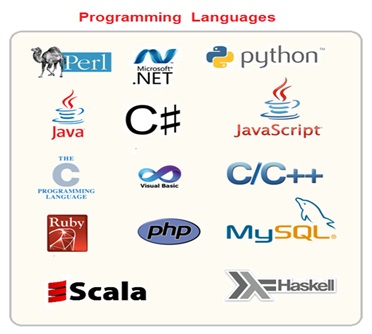
Learn To Code
How to learn Computer Programming ?
The computer programming is still continues to be the most favored choice for many students. The financial rewards and career opportunities for a computer science professional are very good .
And therefore , career in CS is completely worth the efforts and patience which you need to invest , while the learning programming .
There is a huge shortage of qualified professionals in every field of computer science . An opportunity in computer science can put your career on the fast track .
Although , some people might initially find , Learning computer programming a bit challenging and difficult . But every programmer has to go through this learning curve and learn to overcome these challenges .
If you have the right learning strategy in place and follow the best learning practices, you can easily learn the computer programming without much difficulty.
Computer Programming - FAQ
The computer programmer writes the program code depending upon the program logic and the operation to be performed.
Computer programs are generally written in high level programming languages which are human readable.
However, computer can decode and execute only binary machine instructions. And therefore, all high level program are compiled ( converted ) to low level machine readable instruction that computer can directly execute.
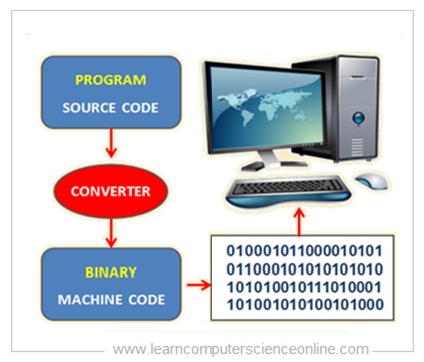
The system programs are internally used by the computer to communicate with various hardware components and hardware devices connected to the computer.
Some system software are also developed to provide utility services to the user.
Application program example include Operating system such MS Windows.

A computer programs written in high level programming languages such as C , C++ , Java , Python , JavaScript and other high level programming languages.
The high level indicates the abstraction which makes the program code human readable.
All high level programs are compiled to low level programs prior to execution.
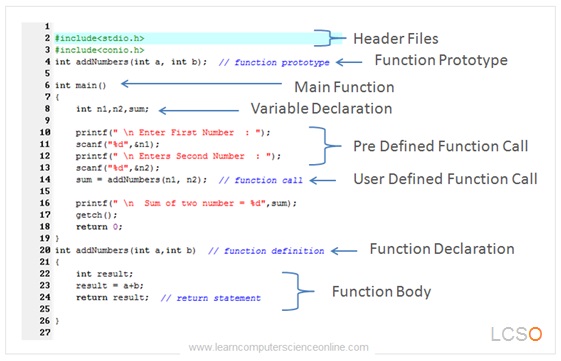
A computer programs written in machine language in Binary is referred as low level program. The low level programs are considered machine readable because it simply contains patters of zero 0 and one 1 used in binary code.
The low level indicates the abstraction which makes the program code machine readable.
All high level programs are compiled to low level programs prior to execution.

Learn To Code
Programming requires a combination of creativity, analytical thinking, and attention to detail. Programmers break down complex problems into smaller, manageable tasks and then develop algorithms and logic to solve them efficiently. They must understand the underlying principles of computer science, including data structures, algorithms, and computational complexity, to write efficient and scalable code.
Successful programmers possess strong problem-solving skills, the ability to think logically, and a willingness to continuously learn and adapt to new technologies. Through programming, individuals can develop software applications, websites, games, and tools that power modern technology and drive innovation across industries. Programming aims to empower individuals to make best use available technologies to unleash the full potential of computers to create solutions that improve lives and advance society.
Join The Best Seller
Computer Science Online Course
This is the most comprehensive and unique Computer Science And Programming Fundamentals course Online which will give you in depth understanding of most important fundamental concepts in computer science And Programming .
